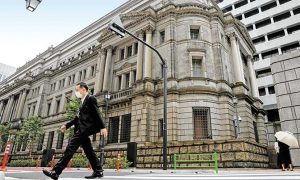Bloomberg
Bank of Japan (BOJ) Governor Haruhiko Kuroda doubled down on his commitment to continue with stimulus even if inflation continues to accelerate, in a rebuttal of the need to join a global wave of central banks normalising policy.
“We don’t know what April’s inflation rate may be, but there’s a possibility it’ll be around 2%,†Kuroda said, acknowledging that a sharp jump in price growth was looming due to rising energy prices and technical factors. “But that in no way signifies there will be a revision of our current monetary policy,†he added.
Kuroda was speaking after the BOJ left its interest rates and asset purchases unchanged and downgraded its assessment of the economy, citing the impact of Covid. The central bank also flagged the high uncertainties over how the war in Ukraine might affect Japan’s economy and prices.
With the decision, the BOJ cemented its outlier status following the rate hikes of the Federal Reserve and the Bank of England this week, a policy divergence that has contributed to the yen falling to its weakest levels against the dollar in more than six years.
“Inflation is around 8% in the US and about 6% in Europe, but in Japan it’s still below 1%. For them it’s natural that they would raise rates, weaken the amount of easing, and move toward normalisation,†Kuroda said. “There’s absolutely no need for Japan to raise rates just because others are doing it.â€
Still, the position for the BOJ’s policy makers is likely to get increasingly awkward over the coming months due to growing public angst over higher inflation on the back of costlier fuel and a weaker currency.
“The BOJ is making it crystal clear that it won’t follow the Fed and other peers in tightening policy. With little wage growth, it can’t tighten so easily especially when uncertainties are intensifying due to the war in Ukraine,†said Izuru Kato, chief economist at Totan Research.
“They are also aware that the meaning of a rate hike in Japan is very different from in the US and Europe because the government has a mountain of public debt. Raising rates here would be tantamount to opening Pandora’s box,†Kato said.
While inflation still remains subdued in Japan, price growth is expected to accelerate more notably from April, when the heavy drag from cell phone fee cuts begins to drop out of calculations.
With a further boost from energy prices also expected, an increasing number of economists are warning inflation could reach 2% or more this year. That might put consumers off spending and deepen public discontent at a time of limited wages growth, while also raising questions about the BOJ’s continued stimulus to generate inflation.
“Businesses and households are becoming increasingly aware of the cost of commodity prices and it’s becoming hard for Kuroda to emphasize the benefit of a weak yen,†said Shinichiro Kobayashi, chief economist at Mitsubishi UFJ Research & Consulting.
The BOJ acknowledged the strengthening price trend in its statement by tweaking its wording on the outlook for inflation, saying it’s expected to “clearly†rise and citing energy prices as a key driver.
But Kuroda said inflation fuelled by rises in commodity prices wasn’t the kind of sustainable price growth the BOJ was looking for and therefore wouldn’t prompt policy change.
“The BOJ is focused fundamentally on whether a broad range of products see price hikes as a result of companies passing on costs, and whether wages start rising,†said economist Harumi Taguchi at S&P Global Market Intelligence. “For the BOJ, their stance is still ‘wait and see’ and that’s why they’re sticking to their position that it’s too early to change policy.â€
The central bank’s downgrading of its view of the economy comes with a majority of private economists expecting another contraction this quarter, mainly due to fallout from the omicron variant that struck earlier in the year.
A weaker economy could complicate Prime Minister Fumio Kishida’s campaign for key elections this summer. On top of the measures he has taken to cap gasoline prices for consumers, the premier is likely to order a large-scale economic package, according to a local media report.
Kuroda said the government’s energy price caps were appropriate but ruled out the need for the central bank to take action to stem falls in the yen. The weaker currency is exacerbating the impact of rising commodity prices and adding to the pain for businesses and households.
The governor maintained his view that the weaker yen was still a positive for the economy. He said it was not in the central bank’s remit to influence exchange rates.
“The BOJ can’t tighten policy because unlike the U.S. and Europe, domestic demand isn’t driving inflation at all,†said Nobuyasu Atago at Ichiyoshi Securities Co., adding that further easing to help the economy would soften the yen further. “The BOJ can’t move in any direction.â€
 The Gulf Time Newspaper One of the finest business newspapers in the UAE brought to you by our professional writers and editors.
The Gulf Time Newspaper One of the finest business newspapers in the UAE brought to you by our professional writers and editors.
